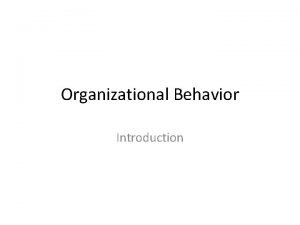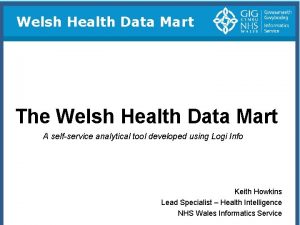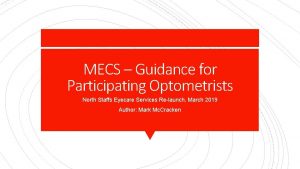THE WELSH EYECARE INITIATIVE WECI expanding the primary
















- Slides: 16

THE WELSH EYECARE INITIATIVE (WECI) – expanding the primary eye care role of optometrists. DR N. J. L. SHEEN

Why develop the WECI? • GPs traditionally manage acute eye problems but optometrists are well placed within the community to provide primary eye health care quickly and effectively. • GPs face an ever increasing burden on their resources and often manage acute eye problems without having access to the full range of diagnostic equipment. • By maintaining as many patients as possible in Primary Care, referrals to Hospital Eye Service (HES) departments can be reduced.

What is WECI? The Welsh Eyecare Initiative (WECI) is an initiative, unique to Wales, that aims to help detect eye problems in susceptible individuals and to enable early assessment of acute eyesight problems.

Within the WECI there are 2 types of eye examinations that can be performed, depending on the patient: 1. A Primary Eyecare Acute Referral Scheme (PEARS) eye examination - for any patient with an acute eye problem. 2. An Eye Health Examination - for selected groups of patients only.

1. The Primary Eyecare Acute Referral Scheme - PEARS. • A PEARS eye examination enables optometrists to address the needs of a patient presenting with an acute eye condition. • Patients can request a PEARS examination themselves (i. e. self-referral) or the request can be via their GP. • A PEARS examination can be carried out by any registered optometrist. Registered optometrists are required to satisfy criteria for equipment, procedures, skills in certain procedures and must have passed the required accreditation. • Optometrists must, within reason, be able to offer a PEARS examination appointment the same day as requested by the patient or GP.

2. The Eye Health Examination Certain groups of people are at an increased risk of developing sight-threatening diseases, or would find losing their sight particularly difficult. Eye Health Examinations, performed by accredited optometrists, aim to detect these diseases at an early stage. Patients are eligible for an Eye Health Examination if they have: • • Sight in one eye only. A hearing impairment Retinitis pigmentosa Family origins that are Black African, Black Caribbean, Indian, Pakistani or Bangladeshi.

How can GPs help? • You can help by referring patients that present to you with an acute eye problem to a registered optometrist for a PEARS examination. • You can also help by informing patients about the Eye Health Examination if they fall into one of the aforementioned categories.

How do GPs refer? • Ask the patient to go along to an registered optometrist – lists are available from your LHB. • Telephone a registered optometrist in your area and ask them to see your patient.

What happens to patients you refer? • You should receive a standardised written report from the optometrist within 2 -3 days of referral. • A fax or telephone call will be provided on the same day if the patient requires urgent referral to the HES. • The HES will feed back to the referring optometrist and the patient’s GP the outcome of the referral.

WECI - accreditation. • Optometrists in Wales who wanted to take part in the WECI (purely voluntary) were required to undertake a process of training and accreditation. • All aspects of accreditation needed to be passed before optometrists were accredited. • Optometrists who want to be registered for the WECI had to pass both the Eye Health Examination and the PEARS examination accreditation. The Low Vision Scheme is independent of the Eye Health and PEARS.

WECI accreditation 2. • Accreditation in two parts: – Theory • Involved reading a series of modules and answering MCQ relating to the modules. This could all be done on a specially developed web -site www. eyecarewales. org – Practical • Optometrists had to demonstrate that they were capable of using certain equipment - training was given if required.

Does the WECI scheme work? The PEARS part of the WECI scheme was first trialled in 2001 in the Vale of Glamorgan.

Initial audit for PEARS in the Vale of Glamorgan. Pxs referred by GP Pxs referred on to HES Managed in community % managed in community GP practices using the scheme Optoms accredited on scheme 2001 242 58 184 76% 2002 500 80 420 84% 100% 86%

Outcome. • The PEARS scheme was successful in South. East Wales, and has now been introduced across Wales. • Optometrists who are registered for the WECI must. Approximately two-thirds of all optometrists in Wales have now enlisted to take part in the WECI.

Benefits. • Patients have improved access to diagnostic eye care service. • Less demands on GPs in primary eyecare. • Multi-professional collaboration and alliances built up. • Allows optometrists to operate at top end of their skills - increased job satisfaction. • For the HES there will be a better quality of referrals - reduction in waiting times.

The future. • Aggressive marketing is required; it will not flourish on its own. Patients, GPs, optometrists and ophthalmologists all need to be continually informed about the WECI scheme and encouraged to use the service. • Full audit for both PEARS and the Eye Health examination is in place. Results will be published in due course.
 New era eyecare
New era eyecare A young welsh factory owner was one of the first
A young welsh factory owner was one of the first Welsh mocha
Welsh mocha Ehew manual
Ehew manual Let's go in welsh
Let's go in welsh Welsh ghost stories
Welsh ghost stories Bill welsh rutgers
Bill welsh rutgers Welsh symbols
Welsh symbols Welsh of the west end - wikipedia
Welsh of the west end - wikipedia Welsh ordinal numbers
Welsh ordinal numbers Lord's prayer aramaic
Lord's prayer aramaic Welsh food
Welsh food Welsh ch
Welsh ch Latin words in welsh
Latin words in welsh Welsh snooker players
Welsh snooker players Welsh bacc personal standpoint example
Welsh bacc personal standpoint example John welsh nvidia
John welsh nvidia






























